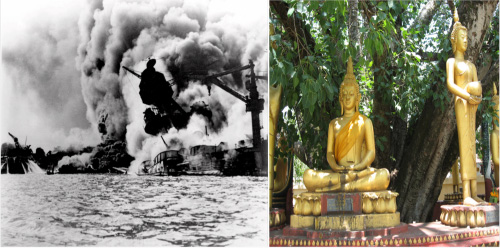
Yesterday marked the 70th anniversary of the Japanese attacks on Pearl Harbor. Thousands lost their lives, and a nation filled its heart with anger. On the following day, December 8th, 1941, President Roosevelt declared war against the Empire of Japan, setting into motion years of bloodshed and retaliation. Many people considered the entry of the U.S. into World War II not a question of ‘if’, but ‘when;’ a spark was just needed to light the fire. And retaliation took the shape of a gun (and in the end, two very scary bombs).
Another event was taking place (across the international date line) on Dec. 8, 1941: a Japanese Buddhist celebration called ‘Rohatsu’, which literally means ‘the eighth month of the twelfth lunar year’. This date celebrates the day in which Shakyamuni Buddha reached Enlightenment, staring into the sky and reflecting upon the impermanence of the evening star. Now, the celebration often begins one week in advance, as Zen monks take a week-long sesshin and end on ‘Rohatsu.’ I wonder if the monks of Japan at the time were celebrating Rohatsu in similar fashion? If so, they would have been blocked off from the world, unaware of what was taking place within their own country and in the U.S. And if they weren’t in sesshin, would they have been able to persuade their empire not to pursue this attack?
The ties between Buddhism and the Japanese empire during this time are a source of contention. Two articles in Tricycle, “The Fog of World War II,” and “Swords of Compassion” are helpful sources of more information on the topic. One particular passage in the latter article presents the shocking viewpoint of Shaku Soen, a prominent Zen master in Japan, regarding the war:
“To Soen, Japan was engaged in a “holy” and “just” war, a “war of compassion” fought by bodhisattva soldiers against the enemies of Buddha. Furthermore, war was “an inevitable step toward the final realization of enlightenment.”
With such a view, celebrating the Buddha’s life and philosophy after attacking Pearl Harbor may not have been an off-the-wall idea. Maybe persuading the Japanese military not to pursue this violent act wasn’t even on the agenda. But of course this is only one Zen master’s opinion; surely the entire Buddhist community in Japan didn’t feel the same way?
In 1941, as the night sky fell upon ‘Rohatsu’ in Japan, what were the monks reflecting on? Were most of them even aware of Pearl Harbor? And as many Americans in Hawaii stared into the flaming sky on December 8th from the burning naval vessels, what were they reflecting on? Were they thinking about the fragility of our existence after witnessing their friends and families disappear, or were they too consumed with anger and vengeance to think about anything else?
Thank you for subscribing to Tricycle! As a nonprofit, we depend on readers like you to keep Buddhist teachings and practices widely available.